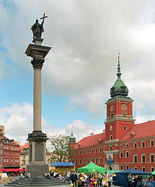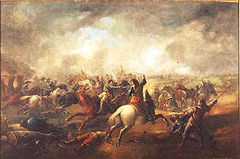1644
| Millennium: | 2nd millennium |
|---|---|
| Centuries: | 16th century – 17th century – 18th century |
| Decades: | 1610s 1620s 1630s – 1640s – 1650s 1660s 1670s |
| Years: | 1641 1642 1643 – 1644 – 1645 1646 1647 |
| 1644 in topic: |
| Subjects: Archaeology – Architecture – |
| Art – Literature – Music – Science |
| Leaders: State leaders – Colonial governors |
| Category: Establishments – Disestablishments |
| Births – Deaths – Works |
Year 1644 (MDCXLIV) was a leap year starting on Friday (link will display the full calendar) of the Gregorian calendar (or a leap year starting on Monday of the 10-day slower Julian calendar).
Contents |
Events of 1644
January–June
- January 26 – First English Civil War – Battle of Nantwich: The Parliamentarians defeat the Royalists, allowing them to end the 6-week Siege of Nantwich in Cheshire, England.
- February–August – Explorer Abel Tasman's second expedition for the Dutch East India Company maps the north coast of Australia.
- March 24 – In England, Roger Williams is granted an official charter for his Rhode Island Colony, allowing the establishment of a general assembly.
- April 19 to April 22 – Battle of Shanhai Pass: The Manchu Qing Dynasty and Wu Sangui gain a decisive victory over Li Zicheng's Shun Dynasty .
- April 25 – A popular Chinese rebellion led by Li Zicheng sacks Beijing, prompting Chongzhen, the last emperor of the Ming Dynasty, to commit suicide.
- June 3 – Li Zicheng claims himself as the emperor of China.
- June 6 – The invading Manchu army, with the help of Ming general Wu Sangui, captures Beijing, China. This marks the beginning of the Qing Dynasty (also known as the Manchu Dynasty), the last imperial dynasty of China.
July–December
- July 2 – English Civil War – Battle of Marston Moor: The Parliamentarians crush the Royalists, ending Charles I's hold on the north of England.
- September 1 – English Civil War – Battle of Tippermuir: Montrose defeats Elcho's Covenanters, reviving the Royalist cause in Scotland.
- September 2 – English Civil War – Second Battle of Lostwithiel: Charles I and the Royalists gain their last major victory.
- September 15 – Pope Innocent X succeeds Pope Urban VIII as the 236th pope.
- November – Battle of Jüterbog: Sweden's forces defeat those of the Holy Roman Empire.
- November 23 – Areopagitica by John Milton is published.

Kolumna Zygmunta is erected.
- December 9 – As Christina comes of age, she is made ruling queen of Sweden.
- December – Plague breaks out in Edinburgh.
Undated
- The opera Ormindo is first performed in Venice: music by Francesco Cavalli and libretto by Giovanni Faustini.
- Kolumna Zygmunta (Sigismund's Column) is erected in Warsaw to commemorate King Sigismund III Vasa, who moved the capital of Poland from Kraków to Warsaw in 1596.
- Philosopher René Descartes publishes Principia Philosophiae (Principles of Philosophy).
- During the English Civil War, Prince Rupert and his men take Liverpool Castle, which is later reclaimed by Sir John Moore.
- Opechancanough leads the Powhatan Indians in an unsuccessful uprising against the English at Jamestown. This is the last such Indian rebellion of the region.
Ongoing events
Births
| Gregorian calendar | 1644 MDCXLIV |
| Ab urbe condita | 2397 |
| Armenian calendar | 1093 ԹՎ ՌՂԳ |
| Bahá'í calendar | -200 – -199 |
| Bengali calendar | 1051 |
| Berber calendar | 2594 |
| Buddhist calendar | 2188 |
| Burmese calendar | 1006 |
| Byzantine calendar | 7152 – 7153 |
| Chinese calendar | 癸未年十一月廿二日 (4280/4340-11-22) — to —
甲申年十二月初三日(4281/4341-12-3) |
| Coptic calendar | 1360 – 1361 |
| Ethiopian calendar | 1636 – 1637 |
| Hebrew calendar | 5404 – 5405 |
| Hindu calendars | |
| - Bikram Samwat | 1700 – 1701 |
| - Shaka Samvat | 1566 – 1567 |
| - Kali Yuga | 4745 – 4746 |
| Holocene calendar | 11644 |
| Iranian calendar | 1022 – 1023 |
| Islamic calendar | 1053 – 1054 |
| Japanese calendar | Kan'ei 21Shōhō 1 (正保元年) |
| Korean calendar | 3977 |
| Thai solar calendar | 2187 |
- January 10 – Louis François, duc de Boufflers, French marshal (d. 1711)
- January 18 – John Partridge, English astrologer (d. 1708)
- April 7 – François de Neufville, duc de Villeroi, French soldier (d. 1730)
- June 16 – Henrietta Anne Stuart, Princess of Scotland, England and Ireland (d. 1670)
- August 6 – Louise de la Vallière, French mistress of Louis XIV of France (d. 1710)
- August 12 – Heinrich Ignaz Biber, Bohemian composer and violinist (d. 1704)
- September 25 – Ole Rømer, Danish astronomer (d. 1710)
- October 1 – Alessandro Stradella, Italian composer (d. 1682)
- October 2 – François-Timoléon de Choisy, French writer (d. 1724)
- October 14 – William Penn, English Quaker and founder of Pennsylvania (d. 1718)
- date unknown
- Antonio Stradivari, Italian violin maker (d. 1737)
- Matsuo Bashō, Japanese poet (d. 1694)
- See also Category:1644 births.
Deaths
- March 15 – Louise Juliana of Nassau, Regent of Bohemia (b. 1576)
- April 10 – Reverend William Brewster, Pilgrim leader (b. 1567)
- April 25 – Chongzhen, last Ming Emperor of China (suicide) (b. 1611)
- July 29 – Pope Urban VIII (b. 1568)
- September 7 – Guido Bentivoglio, Italian statesman and historian (b. 1579)
- September 8
- October 6 – Elisabeth of Bourbon, queen of Philip IV of Spain (b. 1602)
- November 6 – Thomas Roe, English diplomat (b. c.1581)
- November 10 – Luís Vélez de Guevara, Spanish writer (b. 1579)
- December 28 – John Bankes, Attorney General and Chief Justice to King Charles I of England (b. 1589)
- December 30 – Jan Baptist van Helmont, Flemish chemist (b. 1577)
- See also Category:1644 deaths.
